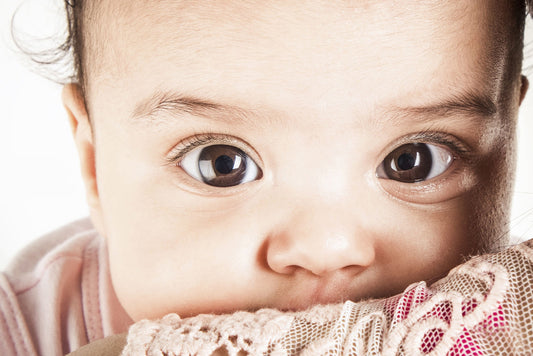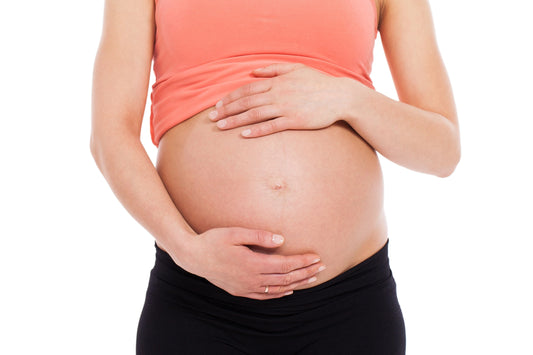When you’re pregnant your body is subject to incredible changes: imagine that your uterus increases in volume up to a thousand times!
It therefore goes without saying that even in the smoothest of pregnancies, an expectant mum can experience a host of pregnancy-related symptoms and minor health issues. Read on and discover all the different symptoms which can appear during pregnancy and which remedies can help.
The first signs of pregnancy
Some women will be extra sensitive to very early pregnancy symptoms even before their missed period or a pregnancy test. Other women may confuse first pregnancy symptoms with PMS, whilst others won’t feel any different until well into their second month.
But what are the first trimester symptoms?
First of all, a missed period should act as an initial alarm bell.
Stomach cramps, increased breast tenderness, clear discharge, headaches, and mood swings may all appear. All these first week pregnancy symptoms can be mistaken for the arrival of your period.
Morning sickness symptoms, needing to visit the toilet more frequently, and feeling more tired than usual may the initial signs you’re pregnant. These are more obvious symptoms.
Pregnancy symptoms: A to Z
What are the signs of pregnancy - not only those early ones but also those that appear in the second and third trimester? Let's take a look one by one, in alphabetical order.
It goes without saying that you won’t experience all of these. This is a guide on how to prevent or manage those most common pregnancy-related symptoms.
While certain symptoms are well known, such as back pain and insomnia, others are unknown to most and may therefore cause some concern.
It’s important to keep in mind that pregnancy is not an illness. Rather a magical condition - there is no other word to describe it! Our bodies undergo tremendous changes during pregnancy, and it’s completely normal to experience minor discomfort.
A mum-to-be shouldn’t feel ill, she simply needs to learn to listen to her body, understand her limits and not overdo it. She’ll certainly need more rest and a slower pace of life than before, but this doesn’t mean she cannot carry on with everyday life.
Anaemia
During pregnancy, especially from the second trimester onwards, mums-to-be risk developing anaemia. This is because, the body, in addition to producing red blood cells for its own use, must also supply the necessary amount of iron needed for the formation of the baby's red blood cells. Therefore, pregnant women struggle to produce enough iron to cover the increased demand.
What are the symptoms of iron deficiency?
- tiredness
- exhaustion
- difficulty breathing during exertion
- heart palpitations
- irritability
- paleness
- difficulty concentrating
- headaches
- feeling lightheaded
- dizziness
How is anaemia diagnosed?
Your doctor will be able to easily suspect the onset of anaemia based on the presence of the main symptoms, as well as blood tests usually carried out each month. A specific blood test will be prescribed to check your iron levels.
What can help?
Specific treatment prescribed by your Doctor may include iron supplements, a diet richer in iron (meat, fish, and eggs), less cheese and dairy products and adding fresh citrus fruit juice to your diet.
It's important that you seek advice from your doctor and do not self-treat.
Breast sensitivity
Sore breasts in pregnancy, a tender breast and increased sensitivity can begin right from the very first few days of gestation, so much so that some women may struggle to sleep on their stomachs.
As the weeks pass by, changes also occur in the nipples and areola area, and they become larger and darker.
Some very small growths may also appear - these are known as Montgomery's tubercles.
From mid-pregnancy onwards, you may find a few drops of colostrum (first milk) coming out of your nipples. Not to worry if this does not happen, both are completely normal!
Our advice:
wear pregnancy-friendly bras from the start, i.e., non-wired, made from natural fabric and with wide straps.
Breathlessness
This is a typical sensation of feeling breathless or short of breath. Breathlessness during pregnancy can especially affect expectant mums during the third trimester, when the uterus has grown in size and is pressing on their diaphragm.
It's often most noticeable when climbing upstairs or walking, but can also occur simply by talking for a long time or bending over to pick something up.
What can help?
Exercising regularly and walking briskly for about 30 minutes a day.
Cystitis
This can occur during pregnancy, but there are a few precautions we can take to help prevent it:
- When washing your intimate areas, always use a front to back movement, never the other way round.
- Drink plenty of water to ensure you urinate frequently and avoid any stagnation of urine inside your body.
- Avoid excessively tight clothing.
Fainting
At the beginning of pregnancy, blood pressure tends to decrease until the middle of the second trimester, due to hormones and increased blood volume. It then slowly starts to rise again and returns to its pre-pregnancy values.
This, of course, is not true for all mums-to-be; every woman is different.
Feeling faint can occur upon exertion or when feeling hot.
How to reduce the risk of fainting in pregnancy?
- Keep hydrated by drinking at least 2 litres of water per day.
- Avoid closed, crowded places as much as possible.
- Avoid staying out in the heat and under the sun for long periods of time.
- Do not go too many hours without eating (to avoid low blood sugar).
Frequent urination
Frequent urination in pregnancy is also extremely common. A sudden immediate urge to pee can appear right from the start and carry on until the end of your pregnancy.
It’s caused by the increased pressure that the uterus exerts on the bladder.
There’s not much you can do, just visit the toilet when and as you need to. Don't try to hold it in, it's not good for you, nor is reducing the amount of liquids you’re drinking. Keeping yourself hydrated is very important!
Gastrointestinal disorders: constipation and diarrhoea
Gastrointestinal discomforts can appear as early as during the first few weeks of pregnancy. There are several causes: hormonal changes (especially the increase in progesterone), changes in eating habits (e.g., nausea and sickness make it difficult to drink water and eat fruit and vegetables), the extra weight of your baby bump...
Constipation in pregnancy is certainly the most common symptom, but some may also suffer from diarrhoea while pregnant.
Diarrhoea pregnancy and constipation pregnancy: What to do?
- Eat fibre-rich foods to combat constipation, such as vegetables, cereals, and fruit.
- Seek advice from your Doctor or Midwife about laxatives that can be dissolved in water and are safe to take during pregnancy.
- Drink plenty of water
- Do some physical exercise every day - walking is great.
Haemorrhoids
If you suffered from them in the past, there’s a good chance they will reappear during pregnancy.
Hemorrhoids during pregnancy form due to the pressure the enlarged uterus exerts on the venous system that carries blood to the rectum area. Constipation during pregnancy is another very common symptom.
In fact, haemorrhoids, and constipation result in a vicious circle as they feed off each other.
What to do if you have haemorrhoids?
- Do not take any medication without seeking advice from your doctor first.
- Consume fibre-rich foods to combat constipation.
- Your Doctor may prescribe a laxative that can be dissolved in water and is safe for use during pregnancy.
- Try not to stay seated for long periods.
Headaches
Headaches in pregnancy most commonly appear during the first trimester.
Women who generally suffer from migraines often experience relief during pregnancy as headaches disappear or diminish. This is due to increased amounts of oestrogen and endorphins, which raise the pain threshold and promote a general feeling of mental and physical well-being.
What to do if you have a headache during pregnancy?
The best medicine is rest. Whilst pregnant, you should not take ibuprofen and ketoprofen drugs. Paracetamol, on the other hand, is considered safe.
Heartburn
Difficulty in digesting and a burning sensation in your stomach are both due to the increased volume of your uterus, which presses on your other organs.
To relieve heartburn in pregnancy, it’s a good idea to avoid all those foods that the body, particularly at this time, can struggle to digest easily: acidic fruit and vegetables such as tomatoes, kiwis, oranges and lemons, yeast, salt, gluten, coffee, and tea.
Insomnia
Throughout pregnancy it’s very common to suffer from nightmares, to struggle falling asleep or falling back asleep again after waking up to have a wee!
Insomnia during pregnancy is due to a mix of hormonal changes occurring in your body, anxiety related to the arrival of a baby and labour as well as the challenge to find a comfortable position whilst in bed.
What are the remedies to combat insomnia in pregnancy?
- Try not to go to bed worrying about not being able to fall asleep, that won’t help at all.
- Do some physical exercise throughout the day, even a short 30-minute walk.
- Eat foods rich in potassium, such as bananas and avocados.
- Avoid heavy foods in the evening.
- Do not drink caffeine.
- Chamomile tea or a relaxing drink before bedtime can help aid sleep (but not melatonin, which is not recommended during pregnancy!)
- Set a sleep routine: every night before going to sleep, repeat the same actions, such as using body lotion, drinking herbal tea, reading a book...
- Sleep on your left side with your Koala Hugs pregnancy pillow, it will keep you comfortable and help you to sleep through the night!
Morning sickness and Nausea
Pregnancy sickness and nausea affect most mums-to-be (70-85% of women experience morning sickness in pregnancy during the first trimester). It usually resolves on its own at the start of the second trimester, although sometimes it can last longer and in some unfortunate cases carry on until the end of the pregnancy.
What helps you combat nausea - pregnancy nausea tips?
- Eating dry foods, such as crackers and biscuits.
- Drinking ginger herbal tea.
- Anti sickness tablets for pregnancy, only if prescribed by your doctor.
Sensitive gums (bleeding gums pregnancy)
You may not be aware, but sensitive gums pregnancy is another common symptom. They can bleed easily, even simply from just brushing your teeth.
This is caused by an increase in progesterone, the steroid hormone which increases significantly during the gestation period.
The function of progesterone is to prepare the womb for the embryo, stimulate blood vessels to ensure the foetus receives the necessary nourishment, control labour contractions, and protect against premature birth.
The huge presence of progesterone during the nine months of pregnancy can lead to inflammation, thus causing swollen gums pregnancy or bleeding gums during pregnancy.
What to do?
- Visit your dentist.
- Use a specific toothpaste to reduce inflammation in the area.
- Rinse with alcohol-free fluoride mouthwash.
Swollen legs
Legs and ankles can start to swell towards the end of the second trimester, especially in evenings and during hot weather.
What are the remedies for swollen legs during pregnancy?
- Walk at least 30 minutes a day.
- Avoid sitting down for extended periods of time. If you have a sedentary job, try to get up from time to time for a short walk.
- Avoid exposure to the sun.
- Bathe your legs with cool water; you can also have a foot bath with salt and water.
- Avoid hot baths.
- Sleep with a pillow underneath your feet - your Koala Hugs pregnancy pillow is perfect!
- Don't wear high-heeled or flat shoes.
- Drink blueberry juice, which strengthens the walls of your veins.
The symptoms described in this article are for information purposes only and in no case replace a diagnosis or treatment prescription by a doctor or healthcare professional. We recommend that you always consult your doctor and/or healthcare specialists.






